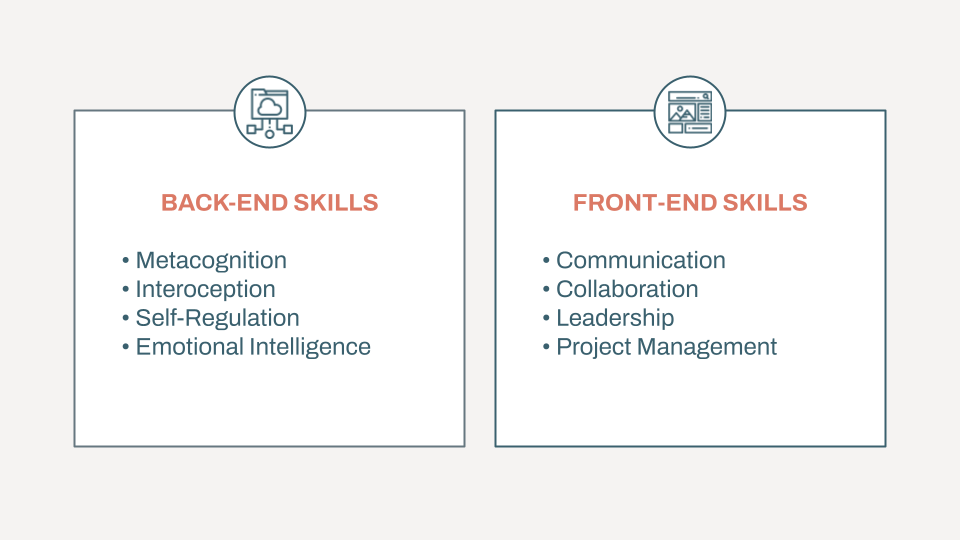Unless you’re a developer, you might seldom consider the code that breathes life into your online experiences. In a nutshell, two main parts work together to shape what you see on your screen whenever you visit a website.
One part is the front-end, which is everything you interact with directly, like the layout and the visual design. The other part is the back-end, which handles all the behind-the-scenes processes that make the website function, such as managing the database.
Think of it like a restaurant. The front-end is the dining area where you sit and eat, and the back end is the kitchen where your food is prepared. Someone who knows how to code both the front- and back-end of an application is called a full-stack developer.
What if you applied this analogy to understanding your cognitive, emotional, and behavioral processes? If your mind was an application, what would the front-end and the back-end look like? What would it mean to pursue full-stack personal development?
As you’ll see, this framework can be a useful way to make the most of your mind.
Working under the hood
Let’s start with the back-end of your mind. Cognitive psychology research emphasizes how internal processes such as metacognition and emotion regulation are fundamental to human performance and wellbeing. Think of it as the part of a website you can’t see but makes everything work, including:
- Metacognitive skills. These are the skills that allow you to evaluate and direct your own thought processes through perceiving how you think and critical thinking. Cognitive psychology research suggests that these metacognitive skills are fundamental to human performance and wellbeing.
- Learning skills. These skills encompass your capacity to acquire new knowledge and behaviors, which includes focusing, sensemaking, memorizing information, understanding unfamiliar material, and learning how to learn effectively.
- Interoceptive awareness. Interoception is your ability to sense internal bodily signals, which can guide decision-making by providing intuitive feedback based on sensations such as hunger, exhaustion, or muscle tension. See my interoceptive journaling prompts to get started.
- Emotional intelligence. This skill enables you to identify, understand, and regulate your emotions so you can respond to your environment with flexibility and resilience. This requires skills such as labeling your feelings, maintaining a confident self-image, and constructive self-talk. Several studies have found that emotional intelligence can also help alleviate burnout.
- Self-regulation skills. These help you take an active role in regulating your actions to do what is most constructive for your mind and body, which in turn allows you to better manage your stress responses. Research shows that mastering these self-directed behaviors can make you more productive, less impulsive, and better equipped to handle life’s inevitable hurdles.
A useful framework for those essential back-end skills are the Inner Development Goals, which focus on developing our inner capacity to deal with our increasingly complex environment and challenges.
And, just like a website needs a high-performing server architecture to run smoothly, lifestyle choices such as practicing stress management techniques, ensuring proper nutrition and exercise, and getting enough sleep can also help improve your back-end skills.
Polishing the user experience
The front-end of your mind includes all of the skills allowing us to interact directly with the world around us, such as our psychosocial and interpersonal skills.
- Communication skills. This is how effectively you’re able to convey information to others, either verbally, in writing, or through body language. These skills enable collaboration, conflict management, negotiation and public speaking. Remember that although being able to express your thoughts is important, being a good listener is also a crucial communication skill!
- Collaboration skills. Studies suggest that working with others increases motivation, but this ability requires understanding group dynamics, dividing responsibilities, and recognizing each member’s strengths. A set of skills you may need to relearn all over again when you change jobs.
- Leadership skills: These determine your ability to lead through persuasion, influence, people management, delegation, and turning information into action to implement change. Leadership skills are what allows people to create a high-performing yet psychologically safe environment.
- Project management skills: This is the way you prioritize and tackle your tasks in the most effective way by understanding the difference between urgent and important items. These include planning, organization and record keeping, as well as knowing when to work with others or outsource when needed.
As you can see, the front-end of your mind enables smooth interactions with the people and environments around you, facilitating interpersonal and professional success that’s aligned with your unique aspirations.
Leveraging your personal development stack
In the same way the division between front-end and back-end in web applications is not so perfect, of course our life skills don’t fit neatly into two well-defined containers.
It would be impossible for us to communicate, lead, and manage our projects effectively if we didn’t have a backend allowing us to cope with stress, feel empathy for others, think critically, and know ourselves.
Still, this is an effective way to think about the way your mind works and to reflect on these topics either on your own or with your team. The concept of full-stack personal development is really just a practical analogy to ensure you explore your skills holistically.
You can ask: Which front-end skills are you missing, and where would you benefit from additional training? What are your strongest back-end skills you’d like to be able to use more often in service of others? Looking at your back-end and front-end skills, what kind of career would make most sense to explore next?
These questions can be explored through journaling, during a coaching session, or as a starting point for a 1:1 performance review. Let me know if you try it!

